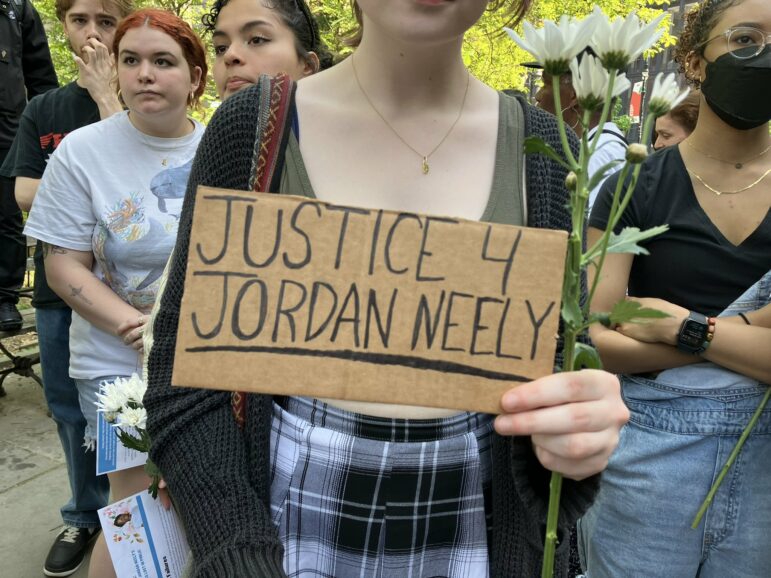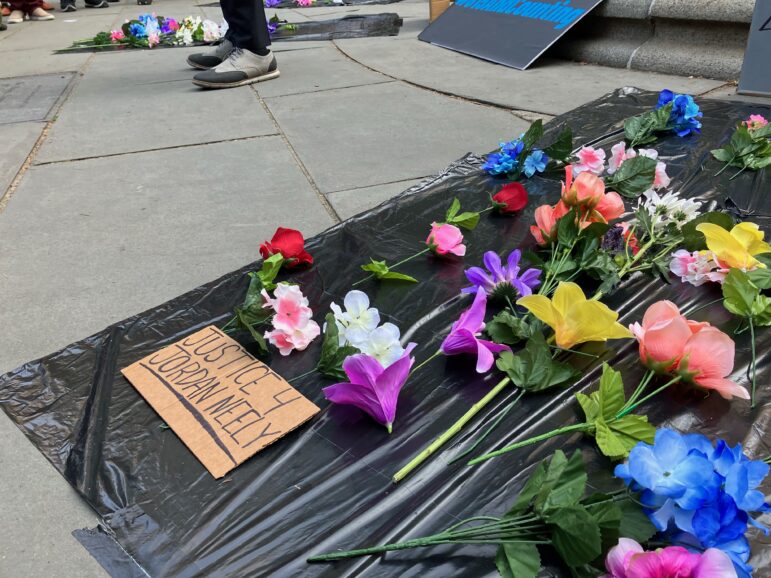Reactions to the news were subdued in City Hall Park Thursday, where the organization VOCAL-NY had gathered to mourn not only Neely, who had been unhoused, but the at least 815 other unhoused New Yorkers who, according to city data, died in the year ending last July.

Emma Whitford
A vigil for Jordan Neely held in City Hall Park Thursday.
Partway through a Thursday evening vigil honoring the life of Jordan Neely, a 30-year-old man choked to death by a fellow straphanger on the F train on May 1, news broke that his killer, Daniel Penny, will be arrested and charged with manslaughter.
“We can confirm that Daniel Penny will be arrested on a charge of manslaughter in the second degree,” said a spokesperson for Manhattan District Attorney Alvin Bragg. “We cannot provide any additional information until he has been arraigned in Manhattan Criminal Court, which we expect to take place tomorrow.”
Attorneys for Penny did not immediately reply to a request for comment. Under New York law, manslaughter in the second degree occurs when one person recklessly causes another person’s death.*
Reactions to the news were subdued in City Hall Park, where the organization VOCAL-NY had gathered to mourn not only Neely, who had been unhoused, but the at least 815 other unhoused New Yorkers who, according to city data, died in the year ending last July.
Jawanza James Williams, organizing director for VOCAL-NY, said some might consider the news a victory, and that people should be held accountable when they harm or kill. But he added that the arrest shouldn’t absolve rhetoric from politicians around public safety, homelessness and mental health which he said fueled vigilantism by Penny.
“We need to have a structural transformation in this city. We need to have a political reckoning about how we talk about human beings,” Williams said.
Participants in Thursday’s rally condemned racism as well as anti-homeless rhetoric, chanting, “Anti-Blackness kills!” Penny is white, while Neely was Black.
Neely’s killing was partially captured on video, and the city’s medical examiner subsequently ruled his death a homicide. According to one witness account posted to Facebook in Spanish, Neely had yelled that he did not have food or drink, and was fed up and didn’t mind going to jail, or dying.
Penny’s attorneys released a statement to news outlets earlier this week alleging Neely had been “aggressively threatening” passengers, saying their client and others on the train who held Neely down were acting to “to protect themselves.”
Attorneys representing Neely’s family, however, accused Penny’s legal team of “character assassination,” and said Penny’s actions on the train “show why he needs to be in prison,” according to a statement shared with media. “He never attempted to help him at all,” their statement reads.
Mayor Eric Adams initially declined to condemn Neely’s killing, instead saying that the investigation should run its course. On Wednesday, he issued a public address saying that Neely did not deserve to die, but did not speak of Penny or the chokehold.
On Thursday, he deferred to Bragg’s office. “The DA will make the determination on how to handle this case,” he said. “And I respect that. I respect DA Bragg.”
Krys Cerisier, an organizer with VOCAL-NY’s homeless union, was also unimpressed by the charges against Penny, though she saw the value in signaling that Penny’s alleged actions were not okay.
“I think if the city responded as quickly with a housing plan, I would have loved that,” she said. “If they would have turned around and been like, you know what, as a result of this we’re going to make sure that everyone can be permanently housed, no one is on the train and vulnerable to these sort of situations, I would have been like, hell yeah.”
“The incarceration of somebody else in an incarceration system we know does not work, does not really do much for me,” Cerisier added.

Emma Whitford
Flowers and a sign calling for justice displayed at City Hall Park, where a vigil was held Thursday for the late Neely.Justine Medina, of the Young Communist League, said New Yorkers deserved credit for taking to the streets to demand charges against Penny.
“I think it’s critical to remember that this concession of him turning himself in is only because we’ve been demanding this indictment,” she told City Limits.
For Rigodis Appling, a public defender, the difference between Penny’s treatment and that of her own clients felt stark. She said New Yorkers of color are frequently arrested on a much shorter time frame than Penny was, and sent to jail on Rikers Island.
“The presumption of innocence clearly only works for white people in this situation,” she said. “And the presumption—not just the grace afforded to an investigation before locking someone away at Rikers Island—is clearly unequally distributed.”
*This story has been updated with the definition of second degree manslaughter.








